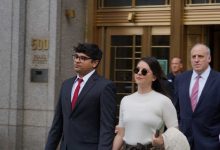Inside SBF’s Trial: FTX general counsel quit after he learned of massive hole in balance sheet

The third week of Sam Bankman-Fried’s criminal trial ended with the testimony of FTX’s former general counsel, Can Sun, who made it all the way to New York from Japan to testify.
Sun testified under a no-prosecution agreement he signed with the Department of Justice on Oct. 17, just days before his testimony, he said. Formerly an attorney at Fenwick and West, Sun joined FTX in August 2021.
As a general counsel, Sun told the court he initially had no insight into FTX’s critical flaw that let sister trading firm Alameda Research borrow user funds without their consent. “Never approved anything like that, and I would never have done it either,” Sun said.
Soon after he joined, Sun became aware Alameda was effectively exempt from automatic liquidations and could go negative on its balance at FTX, Sun said. That seemed inappropriate to him, and he talked to FTX leadership about removing the feature.
In a discussion with Bankman-Fried, head of engineering Nishad Singh and FTX chief regulatory officer Dan Friedberg, Sun said he pressed for change and got promised one: instead of no automatic liquidation, Alameda would get “delayed liquidation.” FTX users were to have been be made aware of this, as well as regulators, and the same feature would be made available to other institutional market makers on FTX. Those changes, however, were never implemented, Sun said.
Alameda Research loans
As a general counsel, Sun was responsible for documenting the loans Alameda Research issued to Sam Bankman-Fried, Gary Wang and Nishad Singh so they could buy FTX equity, he said. However, he was not aware the funds were actually coming from the FTX user deposits, he said. At some point, Sun himself took a $2.3 million loan from Alameda to buy a house in the Bahamas, he said. In hindsight, those loans felt wrong to him, he admitted.
“As general counsel I was involved in transactions that now, in hindsight, may have involved the misappropriation of customer funds, so, out of an abundance of caution, I asked the government for protection,” Sun said.
The last straw that convinced Sun something was wrong at FTX was a call with the asset manager Apollo Global Management in November 2022. Apollo was interested in investing in FTX and asked for a copy of the financial statement. When the copy was produced, Sun was “shocked” to see a $7 billion hole on FTX’s balance sheet related to Alameda. When he confronted FTX leadership about it on November 7, 2022, he received no definitive answers, Sun said.
Sam Bankman-Fried was typing on his laptop during the conversation and then just left the room to make calls, Sun told the court. Later, Bankman-Fried pulled Sun aside and asked him to put together a legal justification for the missing funds. Sun suggested several “theoretical” arguments that would legitimately explain the situation, but none of them really held water, he admitted to the CEO. Bankman-Fried “was not surprised at all.”
The same day Sun also talked to Nishad Singh, and the head of engineering confirmed that the same feature that allowed Alameda to avoid automatic liquidations also allowed it to borrow customer funds.
The next day, Sun resigned, he said.
Week-long break
As Thursday progressed, the court also heard from Robert Bourjeri, a former managing director at the asset managing firm Third Point which invested $35 million in FTX in 2021. Bourjeri was involved in negotiations prior to the transaction, he told the court.
However, if he had known about Alameda Research being exempt from liquidations at FTX, Third Point would not have invested, Bourjeri said.
The trial will now take a week-long break and is due to start back up on Oct. 26.





 Bitcoin
Bitcoin  Ethereum
Ethereum  Tether
Tether  USDC
USDC  Dogecoin
Dogecoin  TRON
TRON  Cardano
Cardano  Bitcoin Cash
Bitcoin Cash  Chainlink
Chainlink  LEO Token
LEO Token  Litecoin
Litecoin  Dai
Dai  Monero
Monero  Ethereum Classic
Ethereum Classic  Stellar
Stellar  Stacks
Stacks  OKB
OKB  Cronos
Cronos  Hedera
Hedera  Cosmos Hub
Cosmos Hub  Theta Network
Theta Network  KuCoin
KuCoin  Gate
Gate  Algorand
Algorand  Maker
Maker  Polygon
Polygon  NEO
NEO  EOS
EOS  Tether Gold
Tether Gold  Tezos
Tezos  Zcash
Zcash  TrueUSD
TrueUSD  Synthetix Network
Synthetix Network  IOTA
IOTA  Bitcoin Gold
Bitcoin Gold  Holo
Holo  0x Protocol
0x Protocol  Zilliqa
Zilliqa  Dash
Dash  Siacoin
Siacoin  Enjin Coin
Enjin Coin  Ravencoin
Ravencoin  Basic Attention
Basic Attention  Qtum
Qtum  Decred
Decred  Ontology
Ontology  NEM
NEM  Lisk
Lisk  Nano
Nano  Numeraire
Numeraire  Pax Dollar
Pax Dollar  DigiByte
DigiByte  Waves
Waves  Status
Status  Hive
Hive  Huobi
Huobi  Steem
Steem  BUSD
BUSD  Ren
Ren  OMG Network
OMG Network  Bitcoin Diamond
Bitcoin Diamond  Bytom
Bytom  Kyber Network Crystal Legacy
Kyber Network Crystal Legacy  HUSD
HUSD